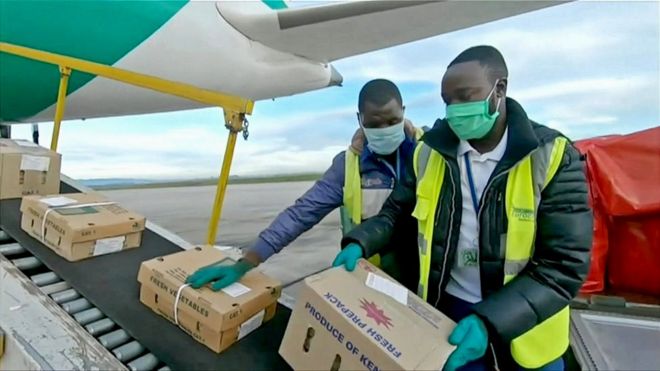Ground staff loading fresh produce into a Kenya Airways Boeing 787 The coronavirus lockdown measures imposed by governments around the world have caused severe disruption to supply chains, as companies were forced to shut in March.
One sector that has been deeply impacted by the pandemic is the flower industry in East and Southern Africa, which is one of the biggest exporters of cut flowers in the world.
Prior to the pandemic, the global cut flower market was worth $13bn (£10.4bn) per annum, according to international flower trade association Union Fleurs.
The European Union and the US are the biggest buyers of cut flowers in the world, Union Fleurs says. Kenya is Africa’s largest flower exporter, with South Africa not far behind.
Multiflora in Johannesburg is one of South Africa’s busiest cut flower auction houses. Prior to the pandemic, the auction house had an annual turnover of $16m. But right now, the auction house is getting 40% of the revenue it previously had.
Delayed and cancelled flights, increased freight costs and a huge fall in demand have brought the flower trade to a virtual standstill, and some flower farms in Kenya have already gone out of business since lockdown began. African solutions to the coronavirus crisis
•Coronavirus: How African firms are being impacted by the lockdown
•The impact of coronavirus on Africa’s economy
All in all, the flower industry in Africa estimates that it has so far had to throw away 241,000 stems as a result of the pandemic.
"If there’s no socialising, there’s no need for flowers. We’re effectively looking at two months of non-trading," Ian Ross, managing director of Flora Export SA tells the BBC. The flower industry in Africa estimates it has had to throw away 241,000 stems since the lockdown began However, many more businesses across the African continent have a focus on importing rather than exporting, flying in goods from China and India and reselling them at a higher price.
Latest data from British property consultancy and estate agency Knight Frank shows that transport costs represent between 50-75% of the retail price of goods sold in Africa."People want to get rich quickly, so the fastest way is to import goods and charge a high markup – many successful people have done this," explains Alex Demissie, managing director of Africa Rising, a business consultancy based in Cologne that advises international companies on entering African markets."They do have pride for […]
